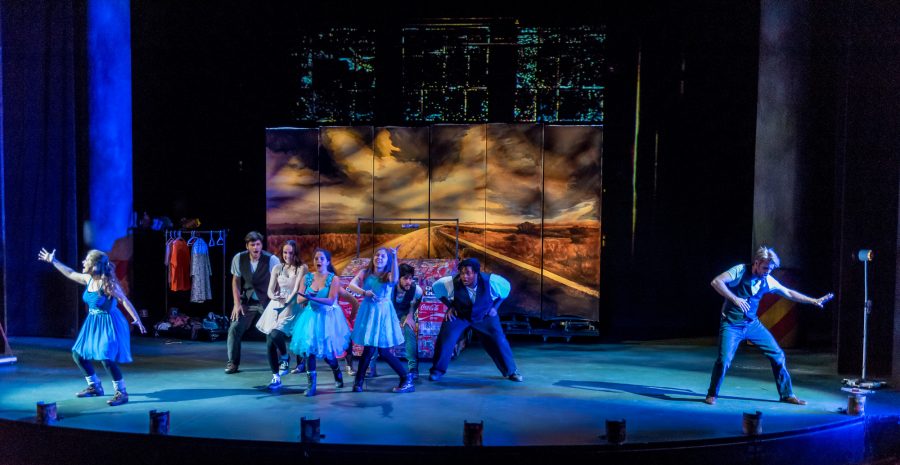University play puts unique twist on “The Simpsons”
Photo Courtesy of Darrell Hoeman
The cast in the second scene of a rehearsal of Mr. Burns, a post electric play in the Colwell Playhouse at Krannert Center for the Performing Arts in Urbana on on Tuesday, October 11, 2016. Directed by Lisa Gaye Dixon, the play runs Oct. 13-23.
October 13, 2016
“Mr. Burns, a post-electric play” opens in a post-apocalyptic United States. Stars shine on the ceiling, crickets chirp and a fire blazes. Four people sit in a dim forest, talking about Matt Groening’s animated show, “The Simpsons.”
The production will run Thusday through Saturday at 7:30 p.m., Oct. 20-22 at 7:30 p.m. and Oct. 23 at 3 p.m. It is in Colwell Playhouse in the Krannert Center and is sponsored by Illinois Theater. Standard tickets are $25, and student tickets are $10.
The play was first performed in 2012 and the playwright, Anne Washburn, received the 2015 Whiting Award for Drama.
“Mr. Burns” has three acts, but does not follow a traditional style of a play. Each act tells a different story, but are all connected by one theme: “The Simpsons.”
Director Lisa Gaye Dixon said everything about “Mr. Burns” is odd because it requires audience members to think deeply. It is not something that a viewer can watch with minimal effort.
Get The Daily Illini in your inbox!
The first act shows a post-apocalyptic world where the characters discuss an episode of “The Simpsons” to get them through the hard times and remind them of who they are, Dixon said. The survivors try to recall the episode, “Cape Feare” and disagree over what actually happens.
When a new character enters, they compare notebooks filled with names of their loved ones and people they have encountered.
The second act follows seven years later; the survivors have formed a theater troupe where they reenact episodes from “The Simpsons.” Their show contains “Simpsons” content, commercials and a capella music.
Actors are in competition with other troupes and fight to “buy” lines that people recall from old episodes.
The third act jumps 75 years into the future. The past characters are long gone. A piano, guitar and a drum appear on stage, and the actors take turns playing them.
The “Cape Feare” episode is now an operatic-musical. Mr. Burns, along with his side-kicks Itchy and Scratchy, are after Bart and want to murder him, but Bart refuses to let that happen.
The play closes with all the actors at the edge of the stage, holding sparklers. They raise them to the sky and sing as the lights dim.
Ensemble member Esther Fishbein said her favorite moment is at the end of act two when a character walks in and a shootout occurs. The three women, including her, are protecting everyone. She said it “gives me a moment of empowerment.”
Throughout the entire play, the idea of stories is an underlying theme.
“No matter what, as human beings, we always need to tell stories, to communicate with each other, to make each other laugh, to comfort, to connect,” Dixon said.
Fishbein said she hopes that the audience will think about what America’s future would be like if an apocalypse were to happen. She said it’s cool that they resort to theater in the play, but questioned what other would people turn to.
While the premise of the play is based on the popular television cartoon, there is more to the play than a dramatic retelling of a “Simpsons” episode.
“I really hope that people aren’t just coming to see it for ‘The Simpsons’ aspect of it, or because they have a class,” Dixon said. “People need to think about, ‘Oh my god what happens if the grid goes down? What happens to America if the grid goes down?’ And I guess in this election season we should probably be thinking about that.”







